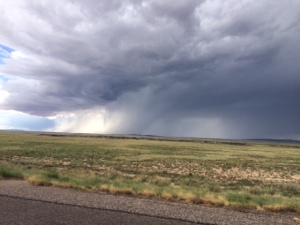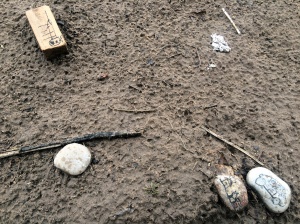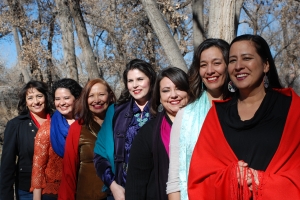We rang in 2015 in Deming.
Grandma China’s been gone eleven years.
We thought it was only ten.
Went ahead with the commemoration anyway.
K. cut three years of hair.
Just like that, he looks older.
Little boys get bigger. He resists.
Sometimes his fear outweighs his trust.
We celebrate risks faced and overcome.
We process the others. He grows.
I see him. I’ve been him.
P. turned 13. She wears eyeliner.
They grow so fast. Cliché. True.
I love who she is becoming.
She is stronger than she knows.
Feast Day at San Ildefonso Pueblo.
The dances root us in place.
I am constantly trying to simplify.
One board at a time—plenty.
After thirteen years, the Saturn died.
We left it where it stalled.
EKCO poets with Shelle and Valerie.
Write ten pages. Cut them up.
Collage them together. Rehearse. Perform.
We finally have a house plan.
There is a window between our bedrooms.
Can’t wait for that to go.
My friend started a book club.
Favorite: Between the World and Me
It’s time to be more honest.
Being a stepmom is no joke.
P. and K. – my greatest teachers.
Hembras. “Mother Lode.” My stepmom play.
My pink rebozo played a baby.
It’s time to write about Harvard.
Then I’ll have a suitcase trilogy.
Packing it to go to college.
Clinging to it after the fire.
Unpacking it to live my life.
I love reading at Sunday Chatter.
The cutest dog ever chose us.
Sat at our gate all day.
K. fed him, named him Leo.
Now he’s ours. I love him.
We lost Henry’s dad, April 20.
My dear friends lost their brother.
Aparna Levine healed my back pain.
I’m not allowed to run anymore.
Insurance pays gym fees. Hello, elliptical.
I’m trying to take up swimming.
Easier on the knees. Great cardiovascular.
Took first lessons since first grade.
I’m still learning how to breathe.
America Healing in Asheville, North Carolina.
Adrián Pedroza for Bernalillo County Commissioner.
It’s hard to share this part.
Depression has me back on Lexapro.
I tried everything I could try.
Running, writing, sleep, therapy, acupuncture, limpias.
Weight lifting. No coffee. No sugar.
Yoga. Meditation. Long walks. Good friends.
Poetry. Theatre. Being harder. Giving less.
Some combinations. Sometimes all at once.
But then there were mornings lost.
I’m kind of a mess today.
Yoga unlocking emotion in my hip.
I’m in tears on my mat.
Hours crying in the living room.
Nobody home. Thank God. I can’t.
And the worst is the judgment.
It came from nobody but me.
Suck it up. Pull yourself together.
Stop crying. Get off the floor.
What is wrong with you now?
You have everything you ever wanted.
You are healthy. You are loved.
Henry. P. K. This place. Words.
People are mean in my head.
Stop messing with my friend Michelle.
If I were my good friend
I’d say, you’re sensitive, that’s beautiful.
I’d say, it’s just for now.
I’d say, understanding why isn’t necessary.
Right now just do what works.
There’s nothing wrong with needing help.
Some people need to be medicated.
I guess I am one of them.
What else is there to do?
I remember I like to dance.
Summer garden wasn’t about the harvest.
I needed my hands in dirt.
I grew stevia, lemongrass, and sunflowers.
I grew six yellow pear tomatoes.
Oaxacan green corn, basil, marigolds, hyssop.
Lemon verbena, bell peppers, volunteer melons.
Grasshoppers and hornworms ate like kings.
K. said to chop their heads.
“Post them on toothpicks as warnings.”
I finally took the curanderismo course.
I want chickens in our yard.
They would help with the grasshoppers.
K. made the school’s archery team.
He and Henry shoot into hay bales.
The Kellogg Fellows are buena gente.
I get to work with six.
Carmen, Carnell, Carlos, Kayla, Sarah, Ventura.
Happy Arte Hour. So much fun.
We are launching an artist cooperative.
coffee, coffee, Zendo, Zia Latte, coffee
We lost Leo. He came back.
We rafted. Let’s do it again!
We lost my cousin, Robert Otero.
My BFF married a good man.
We lost Henry’s cousin, Epi Chavez.
We lost my tío, Joe Calderon.
A wonder he lived so long.
We lost Henry’s cousin, Alfonso Lopez.
P. was the best Halloween chola.
Thanks, Andrea, for doing her makeup.
My godmother was diagnosed with cancer.
P. dyed her hair in LA.
Four hours later, it’s bright pink.
Things I am embarrassed to admit:
I love that Justin Bieber song.
It’s too late to say sorry.
My mama likes everyone, except you.
Why don’t mid-school kids wear jackets?
That hoodie can’t keep you warm.
We lost Berna, a family friend.
Some things I could’ve done without:
Two words. Donald Trump. Enough said.
Middle school girls with duck lips.
Road rage. Police violence. Susana Martinez.
(Pee-tzah. Cokes. Call off your guys.)
I am blessed with good friends.
Stephanie reminded me who I am.
Emmy, thank you for making time.
Avi visited with her youngest daughter.
Anel and I wrote in Santa Fe.
María Limón surprised me one morning.
Finally got to meet Jesse’s kids.
I told them stories about college.
I wish his family lived closer.
Vicki and I ate and laughed.
Got to hold Desiree’s baby Luisa.
It’s time to be more honest.
I am constantly trying to simplify.
I’m still learning how to breathe.
Everything is better when I write.










